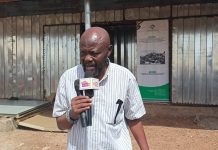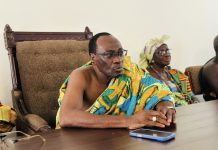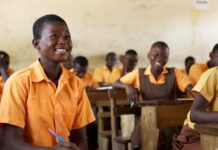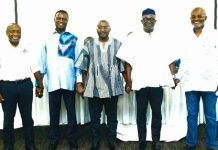NAIROBI, Kenya, February 2022/ — The Norwegian Agency for Development Cooperation (NORAD), has committed to providing grant funding to the African Trade Insurance Agency (ATI) (www.ATI-ACA.org), valued at NOK 500m (approximately USD 56m).
The grant is geared towards the continued implementation of ATI’s Regional Liquidity Support Facility (RLSF) and the development of additional insurance or guarantee products in support of small and medium-sized renewable energy sector initiatives.
The RLSF was created in 2017 to help tackle climate change and attract additional investments by supporting renewable energy projects in sub-Saharan Africa.
The Norwegian Agency for Development Cooperation (NORAD) has committed to providing grant funding to the African Trade Insurance Agency (ATI), valued at NOK 500m (USD 56m), allocated over an initial period of 5 years.
The grant will be geared towards the continued implementation of ATI’s Regional Liquidity Support Facility (RLSF), which aims to mobilise private investment into renewable energy projects in Africa while contributing to the achievement of Sustainable Development Goals 7, 8, and 13, and the development of additional insurance or guarantee products in support of small and medium-sized renewable energy sector initiatives.
The funding from NORAD, which will be split across first loss cash collateral for the various initiatives and technical assistance support for ATI, will be provided by the Norwegian Ministry of Foreign Affairs.
RLSF was launched in 2017 by ATI and KfW, the German Development Bank, to address short-term liquidity risks in financing of small and medium sized renewable energy projects in sub-Saharan Africa, by combining ATI’s suite of insurance products with a liquidity support instrument.
The RLSF policy is used in lieu of (or to complement) the buyer payment security provided by state-owned offtakers under Power Purchase Agreements (PPAs) entered into with Independent Power Producers (IPPs). The risk addressed by the RLSF policy is the delay in payment by the offtaker beyond the credit period provided in the PPA.
Since its launch, RLSF has supported four landmark solar projects in Burundi and Malawi – enabling over USD 150m in project financing and a total installed capacity of 108.5 MW. Beyond RLSF, ATI has supported other renewable energy projects across its member countries, enabling an installed capacity of over 500 MW. ATI’s current gross exposure in direct support towards generation of renewable energy transactions stands at USD 210 million – with the grant and support from NORAD, this exposure is poised to increase significantly in the long term.
RLSF can be accessed by IPPs located in ATI member countries that sign onto the RLSF Memorandum of Understanding (MoU). To date Benin, Burundi, Côte d’Ivoire, Madagascar, Malawi, Uganda and Zambia have already signed the MoU with the expectation that more of ATI’s twenty member countries will follow. In addition to having access to RLSF, IPPs operational in these countries are able to register for the Transparency Tool. The Transparency Tool is a web-based platform designed to show payment trends of public utilities – over time, the tool is expected to bring greater transparency to the sector and potentially increase the confidence of investors and other stakeholders.
In addition to providing support towards RLSF, a portion of the grant will be deployed towards the development of additional guarantee or insurance instruments. These new instruments will have a particular focus on the off-grid sector and other eligible forms of distributed renewable energy. A virtual launch ceremony will be held on 1st March 2022 at 1500hrs EAT (1300hrs CET) to formally announce this new cooperation between ATI and NORAD. For more details on participation, please contact ATI by sending an e-mail to press@ati-aca.org
Quote from Manuel Moses, CEO of ATI
“ATI is proud to be NORAD’s strategic partner on this initiative, which will go a long way in enhancing our renewable energy sector initiatives. Furthermore, this partnership is happening at an opportune moment as Africa is seeing greater interest from public and private stakeholders in the renewable energy sector.
The grant will enable ATI to support more projects reach financial close, thus increasing electricity generation capacity and supporting sustainable economic growth in Africa. We are equally excited by the possibility of developing new products to help spur additional investments in distributed renewable energy sectors that have traditionally not benefited from the same level of funding and insurance support.”
Quote from Thomas Duve, Director – Southern Africa, KfW
“To tackle the climate crisis it is important to have a strong and reliable partner. This is why we are pleased to have NORAD on board as a strong partner for the RLSF. For the African Energy sector, this means another step towards renewable energy. KfW’s support with funding from the German Federal Ministry for Economic Cooperation and Development (BMZ) to the RLSF demonstrates our commitment to this process, and to the development of a sustainable energy market in Africa. Only with that in place can we address the fundamental challenges of energy access, energy security and climate change.”
Quote from Bård Vegar Solhjell, NORAD’s Director General
“This innovative instrument helps unlock the private finance needed to bridge the energy access gap, while also contributing to reduced greenhouse gas emissions. It is an important tool in catalyzing much-needed commercial investments in/to the energy sector in Africa.
Dialogue with renewable energy developers has confirmed the high relevance of liquidity guarantees. Thus, we are confident that NORAD’s support to RLSF will contribute to accelerating investments in renewable energy in Sub-Saharan Africa. NORAD’s decision to support RLSF is based on a thorough assessment. ATI was identified as a very competent institution, and NORAD is looking forward to good cooperation with ATI and KfW.”
About The African Trade Insurance Agency:
ATI was founded in 2001 by African States to cover trade and investment risks of companies doing business in Africa. ATI predominantly provides Political Risk, Credit Insurance and, Surety Insurance. In 2020, ATI closed the year with a gross exposure of US$6.3 billion and a net profit of US$39.4 million, owing to strong demand for ATI’s insurance solutions from the international financial sector and from African governments.
Since its inception, ATI has supported US$70 billion worth of investments and trade into Africa. For over a decade, ATI has maintained an ‘A/Stable’ rating for Financial Strength and Counterparty Credit by Standard & Poor’s, and in 2019, ATI obtained an A3/Stable rating from Moody’s. www.ATI-ACA.org
About The Regional Liquidity Support Facility (RLSF):
ATI and the German Development Bank, KfW, with financing from the German Federal Ministry for Economic Cooperation and Development (BMZ), launched the RLSF in 2017. The Facility was created to help tackle climate change and attract investments by supporting renewable energy projects in ATI’s member countries. RLSF has an initial capacity of EUR 63.2 million and it supports small and mid-scale renewable energy projects with an installed capacity of up to 50 MW (and in exceptional cases up to 100 MW) by protecting the developers against the risk of delayed payments by public off-takers; in turn improving project bankability and ensuring that more projects reach financial close. https://bit.ly/3gw8NaP
About KfW Development Bank:
KfW is Germany’s leading development bank, wholly owned by the German Government and the federal states. It is one of the major implementing agencies of German development cooperation. On behalf of the German Federal Government KfW finances investments and advisory services in developing countries, typically with governmental institutions. KfW projects are aimed at sustainable economic development, social infrastructure and environmental protection. www.KfW.de
About NORAD:
NORAD is the Norwegian Agency for Development Cooperation. The Agency is a directorate under the Norwegian Ministry of Foreign Affairs. In matters regarding Norway’s International Climate and Forest Initiative (NICFI), NORAD reports to the Norwegian Ministry of Climate and Environment.
NORAD’s main purpose is to ensure that Norwegian development aid funds are spent in the best possible way, and to report on what works and what does not work. In addition to Grant programmes, NORAD’s main tasks are Aid advisory services, Quality assurance and monitoring, Communication and Evaluation.https://bit.ly/2Zpq2Sw










































